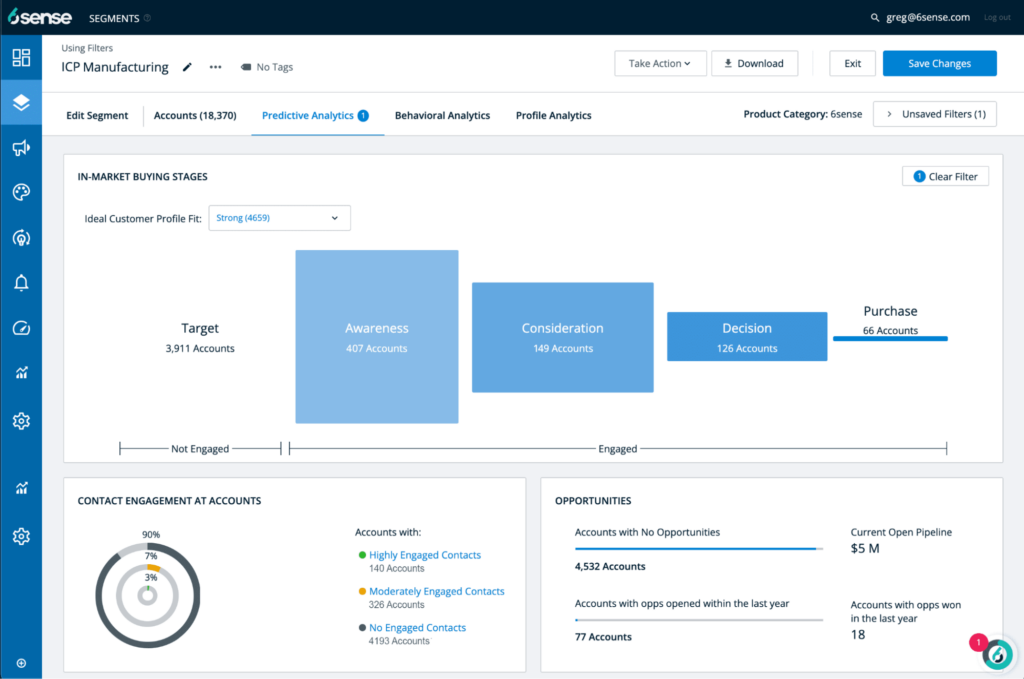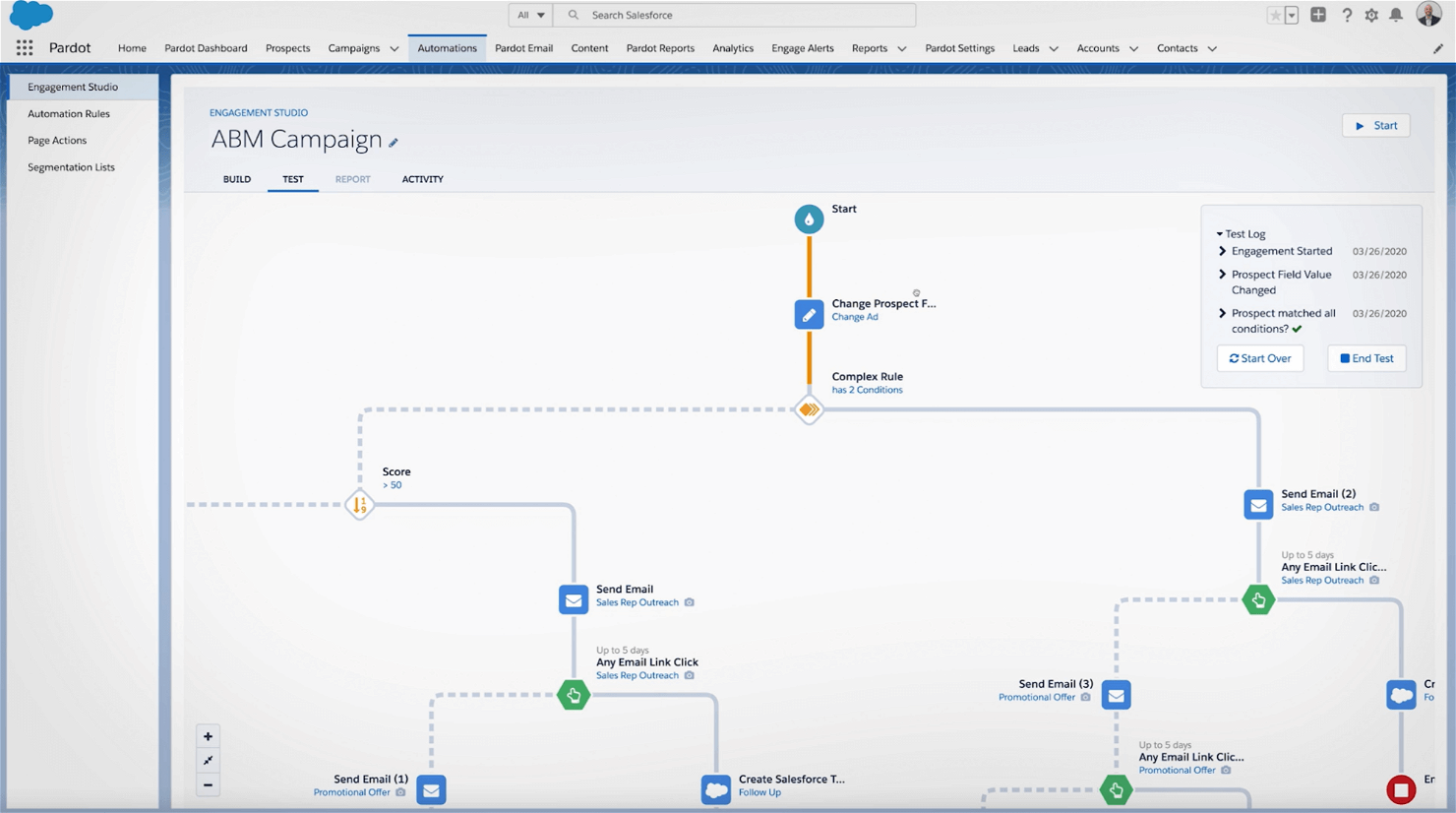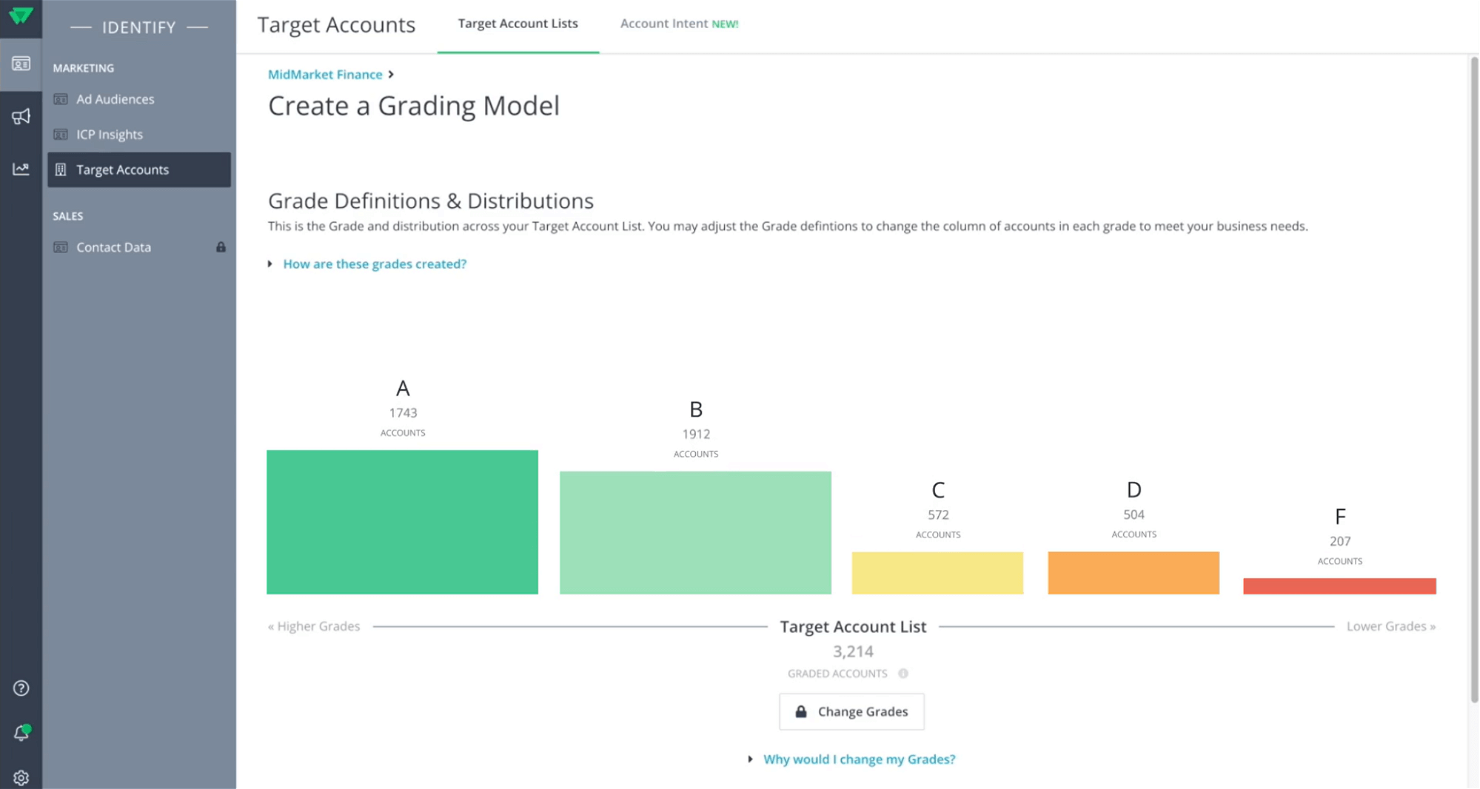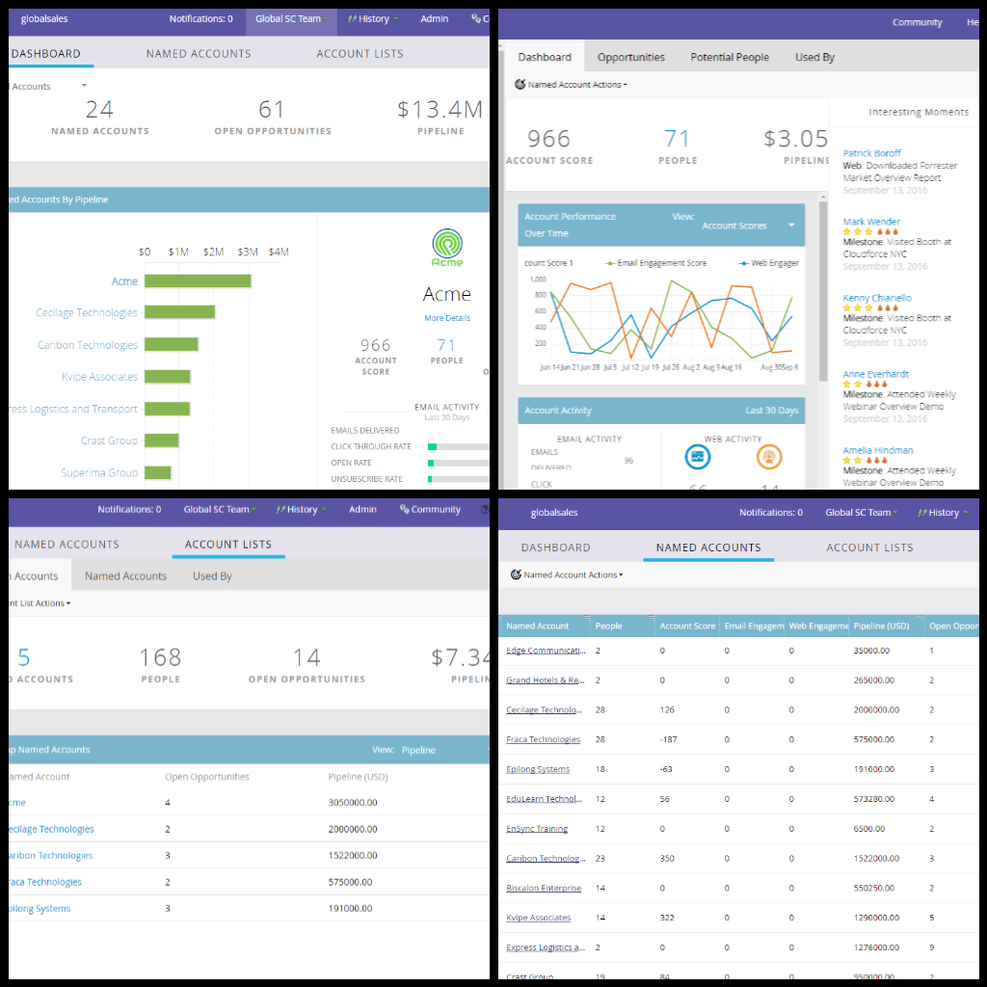10 Best Account-Based Marketing Software Shortlist
Here's my pick of the 10 best software from the 20 tools reviewed.
Table of Contents
- Best Software Shortlist
- Why Trust Us
- Compare Specs Side-by-Side
- How to Choose Account-Based Marketing Software
- Reviews
- Other ABM Software
- Related Marketing Software Reviews
- Selection Criteria
- Trends in Account-Based Marketing Software
- What Is Account-Based Marketing Software?
- Features
- Benefits
- Cost and Pricing
- Additional Account-Based Software Reviews
- Frequently Asked Questions
If you're ready to start landing those whale target accounts, then investing in the right account-based marketing software is a must. The best ABM tools enable your marketing and sales teams too identify, engage, and convert high-value accounts more efficiently, resulting in improved ROI and accelerated business growth.
I've combined my experience battle-testing dozens of ABM platforms plus our painstaking review system to compile this no-nonsense guide to the 20 best account-based marketing software solutions for 2024. Let's goooo!
Why Trust Our Account-Based Marketing Software Reviews
We’ve been testing and reviewing marketing software since 2022. As marketing experts ourselves, we know how critical and difficult it is to make the right decision when selecting software.
We invest in deep research to help our audience make better software purchasing decisions. We’ve tested more than 2,000 tools for different marketing use cases and written over 1,000 comprehensive software reviews. Learn how we stay transparent & our software review methodology.
The Best Account-Based Marketing Software Summary
| Tools | Price | |
|---|---|---|
| Dock | From $49/person/month | Website |
| HubSpot Marketing | From $800/month + $45/month for additional seats | Website |
| Vainu | From €4,200 per year, while the global plan costs €12,000 per year (no monthly plans available) | Website |
| DemandBase | Pricing upon request | Website |
| 6sense | Pricing upon request | Website |
| Salesforce Marketing Cloud | Pricing upon request | Website |
| RollWorks | Pricing Upon Request | Website |
| Marketo Engage | Pricing Upon Request | Website |
| Apollo.io | From $49 per month ($39 billed annually) | Website |
| Terminus | Pricing Upon Request | Website |

Compare Software Specs Side by Side
Use our comparison chart to review and evaluate software specs side-by-side.
Compare SoftwareHow to Choose Account-Based Marketing Software
With so many different account-based marketing software solutions available, it can be challenging to make decisions on what account-based marketing software is going to be the best fit for your needs. As you're shortlisting, trialing, and selecting account-based marketing software, consider the following:
- What problem are you trying to solve - Start by identifying the account-based marketing software feature gap you're trying to fill to clarify the features and functionality the account-based marketing software needs to provide.
- Who will need to use it - To evaluate cost and requirements, consider who'll be using the software and how many licenses you'll need. You'll need to evaluate if it'll just be the marketing team, or the whole organization that will require access. When that's clear, it's worth considering if you're prioritizing ease of use for all, or speed for your marketing software power users.
- What other tools it needs to work with - Clarify what tools you're replacing, what tools are staying, and the tools you'll need to integrate with, such as accounting, CRM or HR software. You'll need to decide if the tools will need to integrate together, or alternatively, if you can replace multiple tools with one consolidated account-based marketing software.
- What outcomes are important - Consider the result that the software needs to deliver to be considered a success. Consider what capability you want to gain, or what you want to improve, and how you will be measuring success. For example, an outcome could be the ability to get greater visibility into performance. You could compare account-based marketing software features until you’re blue in the face but if you aren’t thinking about the outcomes you want to drive, you could be wasting a lot of valuable time.
- How it would work within your organization - Consider the software selection alongside your workflows and delivery methodology. Evaluate what's working well, and the areas that are causing issues that need to be addressed. Remember every business is different — don’t assume that because a tool is popular that it'll work in your organization.
Best Account-Based Marketing Software Reviews
Below you can find my hand-picked top ABM software. I’ve highlighted the ideal use case or standout strength for each option to help you find what might work best for you.
Dock is a sales and onboarding software that offers a way for sales and marketing teams to align their efforts to nurture key accounts through the entire customer journey.
Why I picked Dock: This platform is unique in that it offers a digital sales room where you can identify the most engaged accounts, personalize their client portal with tailored knowledge bases and other sales and marketing assets, and track engagement to help you identify which accounts are more likely to renew and which ones may require more attention.
Dock Standout Features and Integrations
Features include personalized content libraries, custom branding, pricing and order forms, buying signals, dynamic success plans, a flexible workspace editor, secure sharing, digital signature collection, and customizable templates.
Integrations include Airtable, Pandadoc, Typeform, HubSpot, Salesforce, Slack, Zoom, and more.
Pros and cons
Pros:
- Templates for standardizing processes
- Mutual action plans
- Analytics for customer engagement
Cons:
- Engagement analytics are restricted to the Dock platform
- HubSpot and Salesforce integration only available for higher tiers
HubSpot is a platform that offers a comprehensive range of features that cater to marketing, sales, and customer relationship management needs.
Why I picked HubSpot Marketing: Its ABM tools allow marketers to create and manage target account lists, complete with customizable attributes to segment and prioritize high-value prospects. The platform’s tracking features enable detailed monitoring of engagement across various touchpoints, providing insights into the behavior and interests of key accounts. Additionally, HubSpot’s integration with CRM ensures seamless data flow and up-to-date information on account activities.
HubSpot Marketing Standout Features and Integrations
Features include a full-fledged CRM, email marketing management tools, multi-channel attribution, lead-to-account matching, lead scoring, customer segmentation, sales pipeline management, workflow automation, and team management.
Integrations include Slack, Zapier, Microsoft Dynamics, Shopify, Salesforce, Google Analytics, Mailchimp, WordPress, Eventbrite, SurveyMonkey, Zendesk, and hundreds more.
Pros and cons
Pros:
- Easy to use platform
- CRM and email marketing tools are built into the platform
- Good tools for separating campaigns and teams by region
Cons:
- Free version has limitations
- Can get pricey with more advanced features
Vainu is a Finnish sales intelligence platform with a particular focus on Nordic and European companies. It offers a comprehensive company database complete with revenue, industry, technographic data, and key information.
Why I picked Vainu: Vainu, based in Finland, has long had a particular focus on Europe and Nordic countries, and as a result, has higher quality data sets and is better able to facilitate target recommendations for Europe-based campaigns.
Vainu Standout Features and Integrations
Features include multivariable company search, reliable contact data, and smart trigger events.
Integrations include HubSpot, Microsoft Dynamics, Salesforce, and Pipedrive.
Pros and cons
Pros:
- Triggers can help guide your campaign in real time.
- Easy to identify target accounts with multi-variable search.
- Great data set for Nordic countries.
Cons:
- Company information is less accurate and expansive for US companies.
- The global plan costs more than some competitors with lackluster features.
- Key decision-maker data is only available for Finland & Sweden.
Demandbase is a complete ABM platform that's been around since 2007, and has evolved with the industry to become one of the market leaders.
Why I picked Demandbase: Not only is Demandbase a well-established ABM platform, they’ve continued to evolve and add more features over the years. The result is a well-rounded platform suitable for a variety of different use cases.
Demandbase Standout Features and Integrations
Features include a complete account-based advertising platform, cross-channel attribution reports, account-level insights, account identification, and predictive scoring.
Integrations include Adobe Analytics, Amazon Redshift, Alyce, Drupal, LinkedIn, Microsoft Dynamics, Salesforce, Oracle Eloqua, Reachdesk, Sendoso, Uberflip, and VWO.
Pros and cons
Pros:
- The onboarding wizard teaches you how to use the software.
- Modern user interface that's easy to use.
- Set up account-based advertising campaigns quickly.
Cons:
- The default reports can be hard to digest for the average marketer.
- Not true personalization for ad campaigns — Demandbase only supports account targeting.
- Solutions are separate by default (unless you pay a premium for the whole package).
6sense first launched in 2013 as a predictive intelligence platform for sales and marketing. It has since expanded its features, but the strength still very much lies in its AI-based modeling and forecasting tools, which are quite easy to use.
Why I picked 6sense: The platform has a healthy customer reputation, with many B2B marketers and sales managers especially pleased with its revenue forecasting features. If you’re in an industry where moving fast is key, this data can help you interpret campaign results at a quicker pace.
6sense Standout Features and Integrations
Features include intuitive revenue forecasting, real-time account prioritization, trending accounts dashboard, sales activation, and website personalization.
Integrations include Oracle Eloqua, HubSpot, Microsoft Dynamics, Marketo, Salesforce Pardot, SalesLoft, and Sendoso.
Pros and cons
Pros:
- Alerts help sales staff follow up quickly.
- Real-time dashboards help your sales development reps (SDRs) prioritize the right accounts.
- Better data quality than many competitors in company and contact databases.
Cons:
- Limited integrations.
- Limited customization of SDR reports.
- There’s no way to break down interactions by intent.
Salesforce is one of the most widely used CRM tools on the market today, but not everyone knows that it also has robust ABM features.
Why I picked Salesforce: You may already be using the Salesforce CRM to manage customer relationship data. So if you build out your ABM campaigns inside this platform, you can avoid having to onboard all of your sales reps into a completely new tool.
Salesforce marketing cloud Standout Features and Integrations
Features include a built-in CRM, ChatGPT-powered smart assistance, a drag-and-drop automation builder, email marketing, and content personalization.
Integrations include LinkedIn Sales Navigator, Marketo Engage, 6sense, HubSpot, Demandbase, and Workato.
Pros and cons
Pros:
- Smooth content and web personalization using CRM data.
- Easily design automated ABM campaigns with a drag-and-drop-builder.
- Built into the Salesforce CRM.
Cons:
- Support and support materials are underwhelming.
- The contact search function is limited.
- Aspects of the interface are clunky and dated.
RollWorks is a complete ABM platform with built-in sales intelligence, account grading, account-based advertising, account engagement, and revenue attribution tools.
Why I picked RollWorks: The account grading tool makes it easy to effectively implement your account-based marketing strategy without wasting any budget on poor ICP matches.
RollWorks Standout Features and Integrations
Features include account grading, the opportunity timeline, account-level intelligence, revenue attribution, and built-in email and ad campaign management.
Integrations include Salesforce, Hubspot, Marketo Engage, Oracle Eloqua, LinkedIn, Facebook Ads, Uberflip, Microsoft Dynamics, Drift, and Google Analytics.
Pros and cons
Pros:
- Account progression reports are comprehensive and easy to follow.
- Advertising tools make it easy to boost awareness among target accounts.
- Great for prioritizing important accounts at scale.
Cons:
- Some third-party integrations require you to reorganize your data in that platform first.
- Advertising reports show minimal data beyond actions and ROI.
- Limited control over and insight into audience targeting and bidding.
Marketo was one of the originators within the ABM software industry, with early products tackling things like lead insights, sales cycle analytics, and more. These products were later bundled into a single platform called Marketo Engagement, which became Adobe Marketo Engage after the acquisition in 2018.
Why I picked Marketo Engage: Because of its long history and backing by Adobe, Marketo Engage is a feature-rich ABM platform that lives up to the mark in every area of ABM from account identification (with AI-powered tools), to lead generation, campaign implementation (with content personalization), tracking, analytics, and more.
Overall, it’s a cohesive platform with good integrations and is especially suited for large teams that need things like robust user roles and access management.
Marketo Engage Standout Features and Integrations
Features include multi-channel content personalization (from email to websites and beyond), full-fledged user and permission controls, and multi-touch revenue attribution.
Integrations include Salesforce, SAP, Microsoft Dynamics, Google Ads, Facebook Ads, LinkedIn, and the Adobe Experience Cloud.
Pros and cons
Pros:
- Complete overview across multiple channels.
- Impressive content personalization.
- Great access management features for large marketing and sales teams.
Cons:
- Sales intelligence data isn't entirely up to date.
- The user experience can feel a bit disjointed.
- The onboarding costs are expensive and pricing is unclear.
Apollo.io is a sales intelligence platform that takes particular pride in the accuracy of its company and contact information.
Why I picked Apollo: Apollo has earned a reputation as one of the most reliable databases specifically for email addresses of key decision makers in important companies. If your ABM campaigns rely heavily on email outreach, it could be a good fit.
Apollo.io Standout Features and Integrations
Features include a company database with verified email addresses, multivariable search, email sequence management, automated sales meeting scheduling, and more.
Integrations include Salesforce, Hubspot, Sendgrid, Mailgun, Gmail, Outlook, and LinkedIn.
Pros and cons
Pros:
- Email sequence builder is easy to use and master.
- Powerful search features make it easy to find who you’re looking for.
- Best database of professional emails.
Cons:
- Can crash or hang up during larger requests (without data loss).
- It only supports G Suite and Microsoft-connected emails out of the box.
- Doesn’t integrate with some major CRMs.
Terminus was one of the first all-in-one ABM solutions when it launched back in 2014, with founder Sangram Vajre a long-time evangelist of the ABM approach to B2B marketing.
Why I picked Terminus: As veterans in the industry, the Terminus team has put together a solution with extensive features across all stages of ABM over the past nine years. In particular, a well-developed attribution and analytics suite stands out. It's a comprehensive solution but might be too powerful for many SMBs or companies that aren't fully committed to ABM yet.
Terminus Standout Features and Integrations
Features include lead analysis, account insights, predictive scoring, prioritized accounts, website personalization, email campaigns, chatbot, account-targeted display campaigns, and ROI tracking.
Integrations include Salesforce, Hubspot, Oracle Eloqua, Microsoft Dynamics, Outreach, Salesloft, Uberlift, PathFactory, and Crossbeam.
Pros and cons
Pros:
- Revenue attribution is easy to set up and revenue dashboards are comprehensive.
- Features robust integrations with most CRMs.
- Supports cohesive 1:1 ABM campaigns across multiple channels including display, email, and more.
Cons:
- Visit WebsiteOpens new window
- Dashboard and report customization is limited.
- No campaign grouping available.
- Doesn’t track all relevant full-cycle sales rep actions.
Other Account-Based Marketing Software
Here are a few more worthwhile options that didn’t make the Best Account-Based Marketing Software list, but might be the right fit for your needs:
Related Marketing Software Reviews
If you still haven't found what you're looking for here, check out these tools closely related to ABM software that we've tested and evaluated.
- Marketing Software
- Marketing Management Software
- Account Based Marketing Software
- Social Media Management Software
- Email Marketing Software
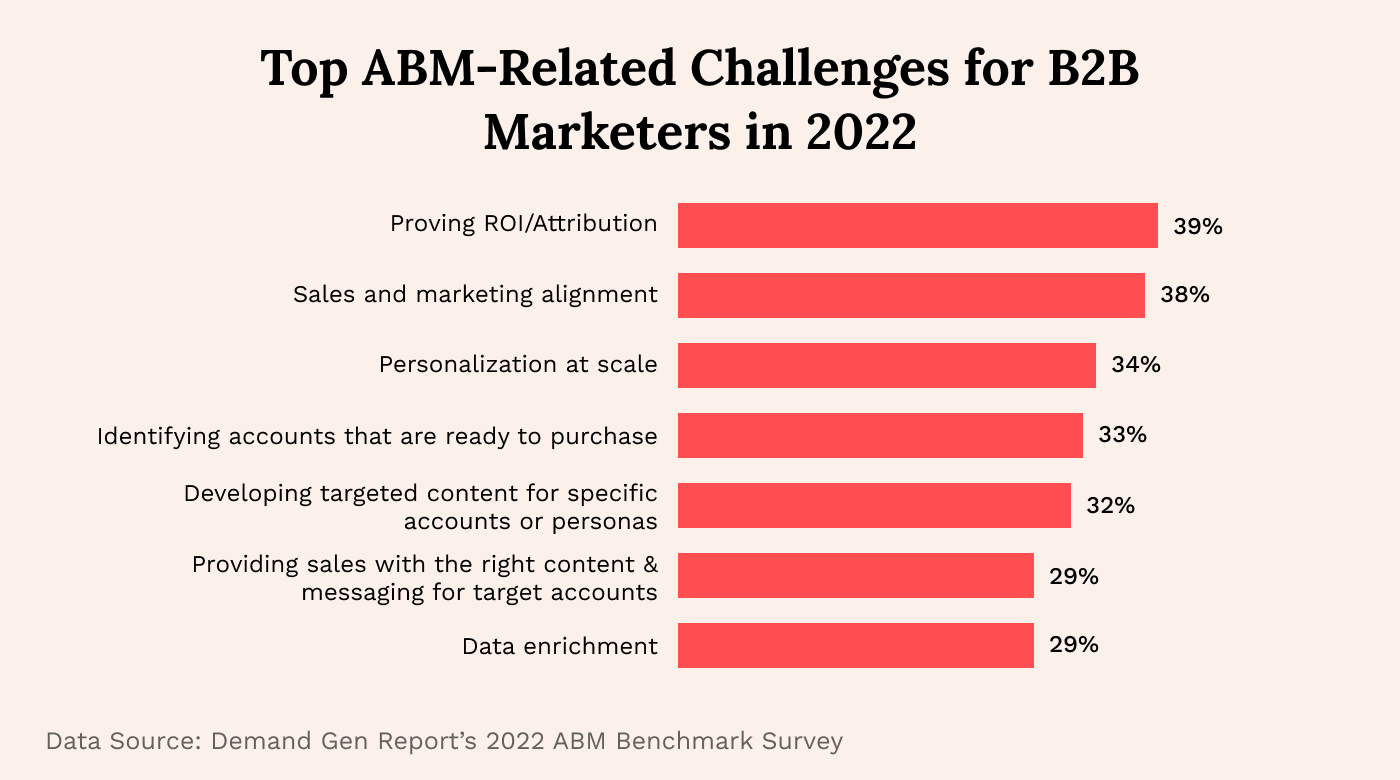
Selection Criteria for Account-Based Marketing Software
Selecting the right account-based marketing (ABM) software hinges on understanding its core functionalities and how these align with specific B2B marketing campaigns and customer relationship optimization needs. Through extensive personal trials and research, I've developed criteria that reflect the essential aspects of ABM software, ensuring they meet the diverse needs and pain points of software buyers.
Core account-based marketing software Functionality: 25% of total weighting score
- Targeting and segmenting high-value accounts
- Creating and managing personalized marketing campaigns
- Integrating seamlessly with CRM and other sales tools
- Tracking and analyzing engagement and campaign performance
- Aligning sales and marketing efforts towards targeted accounts
Additional Standout Features: 25% of total weighting score
- Identifying unique AI-driven insights for predicting account behavior not commonly found in other ABM platforms. Demandbase, for instance, leverages AI for predictive targeting.
- Offering advanced personalization engines that adapt content in real-time based on account activity, as seen in HubSpot.
- Providing comprehensive multi-channel engagement that spans digital and offline channels, similar to Terminus's approach.
- Showcasing sophisticated analytics and ROI tracking capabilities beyond basic performance metrics, akin to Engagio's detailed engagement analytics.
- Facilitating enhanced sales and marketing collaboration through shared dashboards and communication tools, exemplified by LeanData.
Usability: 10% of total weighting score
- A clean, intuitive interface that simplifies complex data analysis and campaign management tasks.
- Drag-and-drop functionalities for campaign design and execution.
- Easy navigation between different modules such as analytics, campaign management, and account targeting.
Onboarding: 10% of total weighting score
- Availability of comprehensive training materials, including videos, templates, and interactive product tours.
- Access to a dedicated customer success manager for personalized onboarding.
- Community forums or knowledge bases where users can learn best practices from peers.
Customer Support: 10% of total weighting score
- 24/7 live chat support for immediate assistance.
- A robust ticketing system for tracking and resolving issues.
- Regularly scheduled webinars to educate users on new features and best practices.
Value For Money: 10% of total weighting score
- Transparent pricing models that align with the features and scalability offered.
- Flexible plans that cater to businesses of different sizes and needs.
- Free trials or demos that allow users to assess the software's value before committing.
Customer Reviews: 10% of total weighting score
- High ratings for ease of use and customer support responsiveness.
- Positive feedback on the software's impact on marketing and sales alignment.
- Testimonials highlighting significant ROI and improved account engagement.
By adhering to these criteria, I ensure that the ABM software selected not only meets the foundational needs of B2B marketing professionals but also stands out for its innovative features, usability, and overall value. This approach helps software buyers make informed decisions that align with their strategic goals and operational requirements.
Trends in Account-Based Marketing Software for 2024
The software landscape, particularly in the realm of account-based management (ABM), is witnessing rapid evolution in 2024, driven by the need to more effectively target and engage high-value B2B accounts. A deep dive into the latest product updates, press releases, and release logs from leading ABM tools reveals key trends that are shaping the future of B2B account marketing.
- Advanced AI and Machine Learning Integration: AI and ML will be used for enhanced predictive analytics for targeting and personalization. Marketers can now engage with accounts more strategically, leveraging AI to tailor messaging and campaigns to the specific needs and potential of each account
- Comprehensive Multi-Channel Engagement Including Offline: This means seamless integration across digital and offline channels. This allows for a consistent and cohesive experience for targeted accounts, ensuring that marketers can reach their audience wherever they are.
- Enhanced Personalization and Dynamic Content: Customers respond better to deeply personalized marketing experiences. Such capabilities enable marketers to create highly relevant and engaging content that resonates with each target account, fostering stronger connections.
- Decline in Broad-Based Email Marketing: We're seeing a shift towards more targeted, personalized communication strategies. This reflects a broader trend towards personalization and strategic engagement, away from one-size-fits-all marketing tactics.
These trends highlight a shift towards more intelligent, integrated, and personalized ABM strategies, driven by advancements in technology and a deep understanding of the unique challenges in B2B marketing.
What Is Account-Based Marketing Software?
Account-based marketing (ABM) software is a specialized tool designed for executing and managing marketing strategies focused on specific, high-value customer accounts. The purpose is to facilitate the identification and targeting of key accounts, personalizes marketing campaigns to suit the unique needs of each account, and aligns marketing and sales efforts for more effective engagement.
This software provides analytics and insights on account interactions, helping businesses to tailor their approach, build stronger relationships, and drive sales with their most important clients.
Features of Account-Based Management Software
When selecting ABM software, it's crucial to focus on features that enhance alignment between marketing and sales, personalize interactions, and measure success accurately. Here are the most important features to look for:
- Target Account Identification: This feature enables precise selection of high-value accounts. It's essential for focusing efforts on accounts with the highest potential for revenue, ensuring resources are allocated efficiently.
- Personalized Campaign Management: Allows for the creation of customized marketing campaigns. Personalization is key to resonating with target accounts, making them feel understood and valued.
- Content Customization Tools: These tools enable the tailoring of content to meet the specific needs and interests of each account. Customized content significantly increases engagement and conversion rates.
- Sales and Marketing Alignment: Facilitates seamless collaboration between sales and marketing teams. This alignment is crucial for a unified approach to account engagement, ensuring consistent messaging and strategies.
- Account-Based Analytics: Offers insights into account engagement and campaign performance. Analytics are vital for understanding how well strategies are working and where adjustments are needed.
- CRM Integration: Ensures ABM software works in tandem with existing CRM systems. Integration streamlines data management and maintains continuity in customer relationships.
- Lead Scoring and Prioritization: Helps identify and prioritize the most promising leads within target accounts. Effective lead management directs attention to opportunities with the highest potential for conversion.
- Multi-Channel Engagement: Supports marketing efforts across various channels. A multi-channel approach is necessary to reach accounts where they are most active, enhancing visibility and engagement.
- Real-Time Alerts and Notifications: Keeps teams informed about account activities and engagement. Timely alerts enable quick responses to account actions, fostering opportunities for deeper engagement.
- ROI Measurement: Tracks the return on investment of ABM campaigns. Measuring ROI is critical for evaluating the financial impact of ABM efforts and guiding future investment decisions.
Selecting the right ABM software requires a careful examination of these features to ensure they align with your business goals and capabilities.
Benefits of Account-Based Marketing Software
Account-based marketing (ABM) software is transforming how organizations approach their B2B marketing and sales strategies, focusing on high-value accounts with personalized campaigns. Here are five primary benefits of ABM software that highlight its value for users and organizations exploring potential software purchases:
- Enhanced Target Account Focus: ABM software enables businesses to zero in on high-value accounts with precision. This focus ensures marketing and sales efforts are concentrated where they can have the most impact, leading to higher conversion rates and more efficient use of resources.
- Increased Personalization: The ability to tailor content and campaigns to specific accounts. Personalization enhances the relevance of marketing efforts, significantly improving engagement rates and fostering stronger relationships with key accounts.
- Improved Sales and Marketing Alignment: ABM software fosters a unified approach between sales and marketing teams. This alignment ensures that both teams work towards common goals, using shared data and insights to inform strategies and drive account engagement.
- Greater ROI Measurement and Accountability: Provides detailed insights into the effectiveness of marketing campaigns. By clearly showing the return on investment for specific accounts and campaigns, ABM software helps organizations make data-driven decisions and adjust strategies for better outcomes.
- Streamlined Campaign Management: Offers tools for managing complex campaigns across multiple channels. This streamlining of campaign management saves time and resources, allowing marketing teams to launch, monitor, and adjust campaigns more efficiently.
Adopting ABM software presents a strategic advantage for organizations looking to deepen engagement with their most valuable accounts. For potential software buyers, understanding these benefits is crucial in making an informed decision that aligns with their business goals and enhances their marketing and sales performance.
Cost & Pricing for Account-Based Marketing Software
Picking the perfect account-based marketing (ABM) software plan isn't rocket science, but it's damn important. You want that sweet spot where you're not paying for bells and whistles you'll never use, but you're also not stuck with a glorified spreadsheet.
Here's the lowdown on what you can expect from each tier of account-based marketing software:
Plan Comparison Table for Account-Based Marketing Software
| Plan Type | Average Price | Common Features Included | Best For |
|---|---|---|---|
| Basic | $500-1000/mo | Target account identification, basic personalization, email marketing, CRM integration | Small businesses or teams new to ABM, looking to get started with core features |
| Professional | $1000-3000/mo | Enhanced personalization, multi-channel campaigns, advanced analytics, lead scoring | Mid-sized companies or growing teams ready to scale their ABM efforts |
| Enterprise | $3000-10000+/month | Custom integrations, dedicated support, AI-driven insights, account-based analytics | Large corporations or sophisticated marketing teams requiring advanced features and customization |
| Free | $0 | Limited target account identification, basic personalization, some CRM integration | Startups or small teams wanting to test ABM strategies before committing to a paid plan |
When considering ABM software, You've gotta match your business needs with the right feature set, or you'll end up with a Ferrari when all you needed was a reliable sedan (or vice versa).
The free option can be a good starting point for small businesses or those new to ABM, while larger organizations or those with more complex requirements may find more value in the Professional or Enterprise plans.
Here's the kicker: don't just think about what you need today. Pick a plan that's got room for your ABM strategies and program as it grows.
New & Noteworthy Product Updates
Below, you’ll find our release notes and take on the latest and greatest ABM software product updates. Discover what’s now possible through feature releases, improvements, and updates on web, desktop and mobile apps. Learn what’s new, if it’s hot—or not, and why it matters for account-based marketing strategy.
April 2024 Updates
These are the noteworthy updates from April.
Vainu Update Notes
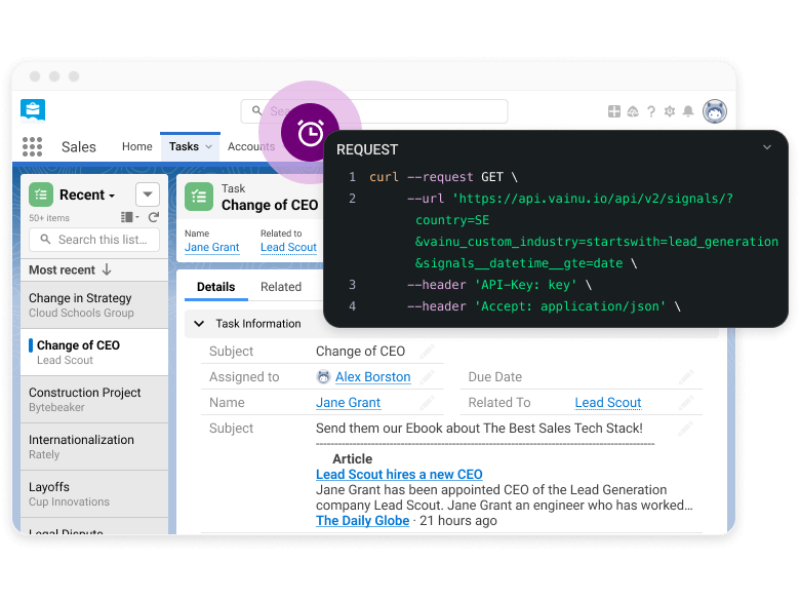
In April 2024, Vainu introduced significant enhancements to its API, focusing on expanding the availability of new datasets and features. This update is aligned with Vainu's API-first philosophy, which emphasizes the importance of making proprietary data easily accessible through the API.
The update primarily enhances the functionality of Vainu's API by incorporating new datasets that are critical for users needing comprehensive and up-to-date business information. Additionally, the update includes various features designed to improve the ease of integration and the efficiency of data retrieval processes.
For Vainu's users, the upgraded API provides substantial value by facilitating more robust and flexible integrations with their existing systems, such as CRM platforms and other business intelligence tools. This means that users can automate more of their data-driven processes, enhance real-time decision-making, and ultimately drive more precise and effective business strategies.
Verdict: Hot! Interconnectivity between software and tools is essential to remain competitive as an ABM platform. All digital platforms should endeavor to expand in this area.
Marketo Update Notes

In April 2024, Adobe Marketo plans to release significant updates to its Interactive Webinars capabilities. These enhancements allow hosts and presenters to customize webinar titles and room names, and manually sync engagement data after events. The platform will also introduce templates for creating customized, branded webinar room layouts.
The ability to alter webinar titles and room settings enhances relevance for participants, while manual data syncing offers precise control over engagement analytics. The new templates ensure consistent, professional branding across webinar presentations.
The value of these enhancements lies in their ability to improve user experience and operational effectiveness during webinars. With greater customization options and better data handling, Marketo users can host more engaging and brand-cohesive webinars.
Verdict: Hot! Webinars are a great inbound marketing technique but it's hard to find the time/budget to manage them. Adobe Marketo users are now a step ahead!
March 2024 Updates
These are the noteworthy updates from March.
DemandBase Update Notes

In March 2024, Demandbase released an important update that significantly automates and enhances its analytical capabilities. The update introduced automatic retraining for Pipeline Predict and Qualification Scores, which are now set to update autonomously every three to six months, eliminating the need for manual recalibration.
The automation of the Pipeline Predict and Qualification Scores retraining process ensures that the scores always reflect the latest behavioral patterns and data insights without any manual intervention. This means that users can rely on consistently updated and accurate scoring to guide their sales prioritization and strategies.
These updates collectively offer significant value to Demandbase users by simplifying workflows, reducing the administrative burden, and ensuring that the data driving their account-based marketing strategies is both current and precise. Companies using Demandbase can now expect more reliable insights into their sales and marketing efforts.
Verdict: Not! While the improvements are great, this is stuff that other marketing lead generation tools have been doing for years!
HubSpot Update Notes

In March 2024, HubSpot introduced an innovative feature to its Marketing Hub, enhancing the functionality of its Ads tool with the AI Assistant for Engagement, Website Visit, and Lead Generation Ads. This new feature allows users to leverage artificial intelligence to craft ad copy directly within the HubSpot platform.
The AI Assistant for Ads simplifies the ad creation process by providing tools to generate, rewrite, expand, or shorten the ad copy. This flexibility allows marketers to quickly produce tailored content that aligns with their campaign objectives and audience preferences. The assistant not only drafts original ad copy based on the user’s prompts but also offers options to modify the generated text.
The value of this update to HubSpot users lies in its potential to streamline ad operations and enhance productivity. By automating the initial stages of ad copywriting, the AI Assistant significantly reduces the time and effort traditionally required to create compelling advertisements. Plus, the ability to instantly revise and adapt the AI-generated copy empowers marketers to maintain a high level of creativity and relevance in their ads.
Verdict: Hot! Being able to generate potential ad copy with AI in seconds will save a lot of marketers a lot of time.
February 2024 Updates
These are the noteworthy updates from February.
6sense Update Notes

In February 2024, 6sense introduced a significant enhancement to its suite of B2B marketing tools with the launch of the AI-Driven Data Consistency Tool. This innovative tool is designed to address common challenges faced by businesses in managing and integrating data across diverse platforms and systems.
The AI-Driven Data Consistency Tool functions by automating the synchronization of data across various platforms, which helps in minimizing the discrepancies that typically arise during data handling. By reducing errors and inconsistencies, this tool ensures that the data used across all systems is accurate and uniform.
The value of this tool to users lies in its ability to enhance the reliability and quality of data within an organization. For businesses, especially in the B2B sector, having consistent and error-free data is fundamental to making informed decisions, developing effective marketing strategies, and achieving operational efficiency.
Verdict: Hot! Data consistency is critical to harvesting good analytics from different marketing sources. The boost in brand consistency doesn't hurt, either.
Salesforce Marketing Cloud
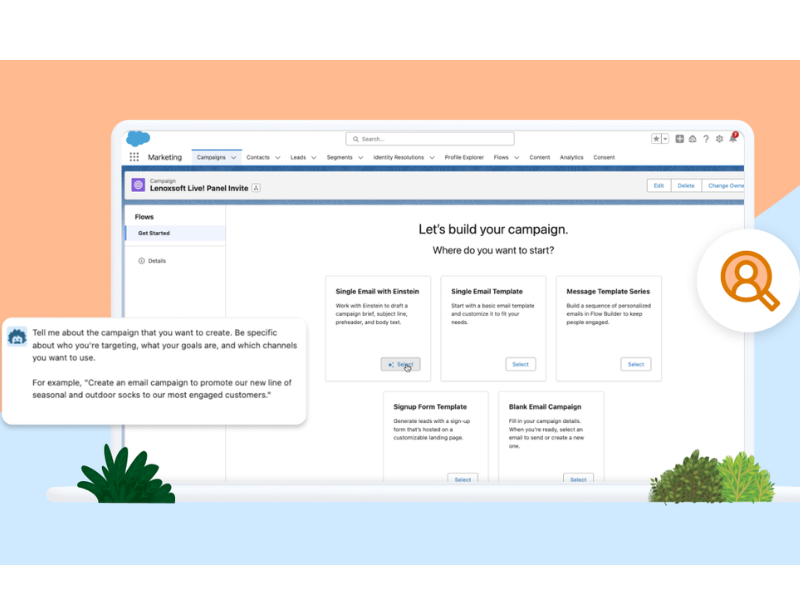
In February 2024, Salesforce unveiled a significant addition to its suite of marketing tools with the launch of the Marketing Cloud Growth Edition. This new platform is specifically designed to cater to the needs of small and medium-sized businesses (SMBs) and is built on the advanced Einstein 1 platform.
The Marketing Cloud Growth Edition offers a comprehensive set of tools that enable the creation and management of multi-channel marketing campaigns, ensuring that SMBs have access to enterprise-level marketing capabilities. It leverages the power of Salesforce's Einstein 1 technology, which incorporates AI to enhance campaign effectiveness through smarter targeting and optimized resource allocation.
The value of the Marketing Cloud Growth Edition lies in its ability to democratize advanced marketing technologies for smaller businesses, which often struggle to compete with larger corporations that have deeper pockets and more extensive technical resources.
Verdict: Hot! Salesforce Marketing has long felt unattainable for small to mid-sized businesses, even if they know it's the right software to help them grow. The Marketing Cloud Growth Edition is the perfect fix.
Q4 2023 Updates
These are the noteworthy updates from Q4 2023.
Apollo.io Update Notes

In Q4 2023, Apollo announced a heafty 3.0 update. Apollo.io 3.0 represents a significant leap forward in the world of go-to-market (GTM) platforms. With cutting-edge technology and access to Apollo’s premium buyer database, this update promises to revolutionize how businesses approach sales and marketing.
At the core of Apollo.io 3.0 lies its advanced artificial intelligence capabilities. Machine learning algorithms analyze vast amounts of data, providing sales teams with actionable insights. From lead scoring to personalized outreach recommendations, the AI assists at every stage of the sales funnel. Apollo.io taps into its extensive premium buyer database, which includes detailed information about potential customers.
Whether it’s identifying warm leads, personalizing communication, or automating routine tasks, Apollo.io 3.0 ensures that every action counts. The platform also democratizes data; sales reps gain access to real-time insights, helping them make informed decisions.
Verdict: Not! Until I see it excel in action, this seems like basic functionality that other tools already have! I'll keep an eye on Apollo.io 3.0 and see if it delivers.
Frequently Asked Questions
Below, I answer some of the most commonly asked questions about the topic of ABM software.
Is Salesforce an ABM platform?
Why use an ABM tool?
How do ABM tools integrate with sales platforms?
What ABM software is most cost-effective for small businesses?
Can ABM tools track and attribute offline conversions?
How do ABM platforms manage cross-channel marketing efforts?
Additional Account-Based Software Reviews
I've reviewed other account-based tools, as well. You might also want to check out:
- Account-Based Data Management Software
- B2B Marketing Software
- Marketing Account Intelligence Software
- Marketing CRM Software
Conclusion
There are many different approaches, budgets, and levels of commitment to account-based marketing, so no single platform can be right for everyone. Plus, ideally, you want a platform that integrates with your existing CRM and other key tools right out of the box.
For more hand-picked marketing software recommendations and expert tips, sign up for The CMO Club newsletter.










